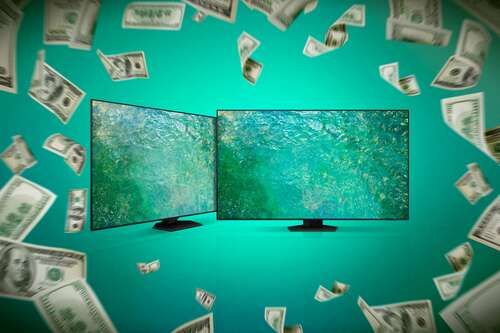
Key Takeaways
- You can save money by buying last year’s flagship TV, as prices drop significantly with the release of newer models.
- You won’t lose out on much as upgrades are mostly incremental and older flagships still offer the best features.
- Another benefit of going with a flagship TV, even one from the previous year, is better software support than mid-range and budget models.
While manufacturer marketing may tempt you to invest in the latest flagship TV, a wiser financial move would be to opt for last year’s model. By doing so, you’re not only getting a high-quality TV but also making a smart choice that maximizes your budget.
You’ll Save Money
Flagship TVs are premium devices and command premium pricing. However, as the companies introduce newer flagship models, both manufacturers and retailers want to clear out the old stock to make way for newer TVs. This is often achieved by offering significant discounts on the previous year’s models, including flagships.
For example, the 65-inch model of the LG G3, which is the company’s 2023 flagship 4K OLED TV, is selling for $2,596 in April 2024, down more than 20% from its price of $3,299 in April 2023. In comparison, you’ll have to shell out $3,397 for the 65-inch LG G4, the current flagship. Even the 65-inch LG C4, which sits one step below in LG’s portfolio, is currently selling at around $2,600. So, by going with the G3 in 2024 rather than the G4, you’ll save $800 and still get a flagship-grade television with all the bells and whistles you can ask for. The same is true for most other flagships from other manufacturers.
The discounts on the previous year’s TV models only grow larger with time. However, it’s important to note that if you wait too long after the newest models are released, finding the older model might become more challenging. So, seize the opportunity and make a smart purchase at the right time.
You’ll Get the Best, New-Enough TV Technology
It’s natural to wonder what you might miss out on by buying last year’s flagship. However, the truth is, you’re not losing much. Contrary to what TV advertisements and other marketing might suggest, the year-over-year upgrades in TVs are mostly incremental, ensuring that even last year’s flagship models are equipped with the latest, “new-enough” TV technology.
If you compare the Samsung QN90C and QN90D, the 2023 and 2024 4K flagship Neo QLED TVs from Samsung, you only get a slightly higher 144Hz refresh rate, minor improvements in local dimming performance, and a new processor for slightly better upscaling in the QN90D. Otherwise, the two TVs are pretty much the same.
There may be a slightly bigger upgrade occasionally, but it’s rarely a huge jump. Those only happen every few or more generations. Average TV viewers are unlikely to even notice a big difference in the picture quality of this year’s and previous years’ TV models.
Flagship Models Have Better Software Support
With the advent of smart TVs, software has become a big part of the television experience. Just like smartphones and tablets, smart TVs are expected to get regular software updates. Besides adding new features and interface improvements, software updates often bring crucial patches for security bugs. Unfortunately, not all TVs receive software updates after their release.
However, if you invest in a flagship model, even a previous year’s model, you can expect software updates for at least a couple of years, if not more. Similar to how flagship phones get more updates than entry-level or mid-range smartphones.
So, buying last year’s flagship TV can be a smarter decision than purchasing a similarly priced high-end or mid-range TV from this year.
You Won’t Encounter Any Surprises
Newer TV models, including flagships, sometimes have bugs and other problems that impact your TV ownership experience. However, if you purchase an older model, you can rest assured that the significant time gap between the release of the TV and you buying it will be enough for the majority of issues to come out and the fixes to be released. This ensures that you won’t end up spending money on something that doesn’t function how it’s supposed to, giving you a sense of security and confidence in your purchase.
But, Wait for the Best Time to Buy a TV
While you’ll get the most bang for your buck with previous year’s flagship TVs, you can get an even better deal if you’re willing to wait for the right time. Not only do last year’s models continue to get cheaper as the year progresses, but you can also save an even bigger chunk of change by shopping during major sales events. Amazon Prime Day, Super Bowl sales, Black Friday, and Cyber Monday see some of the biggest discounts on TVs and other electronics. You can save quite a bit of money by waiting for one of these sales events.
While the Super Bowl sales happen early in the year, days before the Super Bowl, you can expect the Prime Day sale in July. Black Friday is the day after Thanksgiving, whereas Cyber Monday is the Monday after Thanksgiving.
Do keep your expectations in check as flagship TV models, even last year’s models, won’t get an insane discount during any sale. But you can still score a pretty good deal.
If you need help picking the most suitable TV for your needs, we have a fantastic guide that details everything you need to know. You can also consult our best 4K TVs and the best gaming TV guides for some TV recommendations.

